Update 44
In the online Virtual Shop
Nestlé Monster T Shirts now available

Thanks to Rebecca Clark for this image, also available on a reusable shopping bag.
Infant Formula Explained DVD

In the main 25-minute programme, the experts explain about formula to give health workers the information and the confidence they need to answer questions from parents and carers.
A shorter 7-minute programme is for use with carers and parents who have decided to formula feed (and health workers with less time available).
There is also a 10-minute film on how to make up powdered formula in line with World Health Organisation guidance to reduce the risks from possible contamination with harmful bacteria.
Clips are available to view on the Baby Feeding Law Group website - click here.
The DVD is available for use in health facilities and with mother support groups under licence - click here.
Complementary Feeding: Nutrition, Culture and Politics
 This is the new book from Gabrielle Palmer, author of The Politics of Breastfeeding (and one of the experts appearing in the Infant Formula Explained DVD). This brief, compassionate and thought-provoking new book will be of interest to anyone who is curious about the world, its children and their nutrition, and will stimulate discussion and debate as part of the campaign to create a world where health for all is a true goal.
This is the new book from Gabrielle Palmer, author of The Politics of Breastfeeding (and one of the experts appearing in the Infant Formula Explained DVD). This brief, compassionate and thought-provoking new book will be of interest to anyone who is curious about the world, its children and their nutrition, and will stimulate discussion and debate as part of the campaign to create a world where health for all is a true goal.
Sponsorship
 Many thanks to Sally Etheridge (pictured here with her daughter) for raising £200 in a sponsored bike ride and to Helen Webster for asking for donations instead of presents for her party.
Many thanks to Sally Etheridge (pictured here with her daughter) for raising £200 in a sponsored bike ride and to Helen Webster for asking for donations instead of presents for her party.
Contact us if you have a fundraising idea. We can help publicise it and provide materials for explaining the campaign.
Holding Nestlé to account
Nestlé BabyNes system breaks Code and endangers health
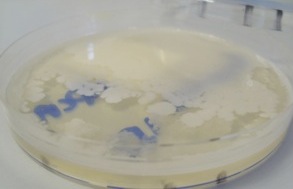 Baby Milk Action and IBFAN are publicly repeating their call for Nestlé to modify its new BabyNes ‘nutrition system’ to follow the joint FAO/WHO Guidelines for the safe preparation, storage and handling of powdered infant formula (WHO PIF Guidelines).
Baby Milk Action and IBFAN are publicly repeating their call for Nestlé to modify its new BabyNes ‘nutrition system’ to follow the joint FAO/WHO Guidelines for the safe preparation, storage and handling of powdered infant formula (WHO PIF Guidelines).
The machine prepares an instant bottle of infant formula using a capsule containing powder, which is not sterile and may contain harmful bacteria. The WHO PIF Guidelines include a step to kill such bacteria. Nestlé also claims to add bacteria to the formula, using this as the basis for unproven health claims in its marketing. The machine received worldwide publicity from a launch to the media in Switzerland, which violated marketing requirements.
Nestlé executives refuse to introduce the step that kills bacteria or to warn on labels that powdered formula is not sterile. Laboratory analysis of capsules of baby milk for BabyNes machines detected the presence of bacteria, proving that the milk powder in the capsules is not sterile, as shown in the photo.
In the UK companies are required to add warnings to labels after many years campaigning by Baby Milk Action and its partners. For example, Danone’s Cow & Gate and Milupa brands state: ”because powdered milks are not sterile failure to follow instructions may make your baby ill” while Wyeth’s SMA brand states: “While this product is made up under strict hygienic conditions, it is not sterile. Failure to follow instructions on preparation and storage may make your baby ill.”
Recent worldwide studies have detected pathogenic bacteria such as Enterobacter sakazakii, Salmonella species and E. coli in samples of PIF. Previous tests reported by the US Food and Drug Administration revealed that 14% of packages contained bacteria that are potentially harmful, such as E. sakazakii.
Nestlé, the London Marathon, the Olympics and water
 After raising concerns about Nestlé sponsorship of the London Marathon with its Pure Life brand of bottled water, Baby Milk Action has learned that the contract still has a number of years left to run.
After raising concerns about Nestlé sponsorship of the London Marathon with its Pure Life brand of bottled water, Baby Milk Action has learned that the contract still has a number of years left to run.
We have been told there is little point meeting with the organisers until they are considering new suppliers. The London Marathon sponsorship policy is confidential. The Charity Commission calls for transparency and care over sponsors and so we raised concerns with it as 100% of the London Marathon surplus is handed to The London Marathon Charitable Trust. However, as The London Marathon Ltd runs the marathon and is a company not a charity (albeit one wholly owned by the London Marathon Charitable Trust), charity law does not apply.
Click here for information on Charity Commission guidance on corporate sponsorship, the "Nestlé-Free Zone" at the 2011 marathon (left) and details of the controversy surrounding Nestlé's Pure Life brand.
● Nestlé is sponsoring Team Nestlé, four UK athletes in training for the Olympics.
● Nestlé Chairman, Peter Brabeck-Letmathé, is spearheading the Water Resources Group, a joint venture with the World Bank. According to Corporate Accountability International:
“In order to be eligible for support from this new fund, all projects must “provide for at least one partner from the private sector,” not simply as a charitable funder, but “as part of its operations.” The US-based group commented: “Global water corporations must not be allowed to tap into public ‘development funds’ to promote their private agenda because case after case shows that profitability and fulfillment of human rights in the water sector are at odds.”
Nestle boycott news
URC ends support for the boycott - over a technicality
The United Reformed Church (URC) has been a long-time supporter of the Nestlé boycott and for many years provided a small annual grant to Baby Milk Action. We were surprised and disappointed, therefore, to learn in 2011 from the URC Secretary for Church and Society that the Mission Committee was instructing the Mission Council end URC support for the Nestlé boycott under the terms of a motion adopted by the Church Assembly in 2010.
The Assembly renewed support for the boycott until such time as Nestlé is admitted to the FTSE4Good ethical investment index. The motion was adopted as an alternative to a move by URC Church and Society to call off the boycott and invest in Nestlé, a position taken after a meeting with Nestlé Vice President, Niels Christiansen.
Nestlé was admitted to FTSE4Good in March 2011, not because it stopped violating the baby food marketing requirements, but because the FTSE4Good criteria were changed in September 2010 to allow companies to be included even while systematic violations are continuing. URC representatives have been advising FTSE on these changes - alongside other church groups that already have substantial investments in Nestlé (page 4).
Baby Milk Action asked if the URC Assembly could have the opportunity to revisit the issue given that Nestlé would not have been included in the Index under the criteria in force at the time of its 2010 decision.
We were told it is impossible to take the matter back to the Assembly and the motion is binding, even though superseded by events. The instruction to end the boycott was given to the Mission Council meeting in November 2011. For full details - click here.
Development agencies in Laos snub Nestlé prize
Save the Children Australia, Oxfam and 13 other Aid agencies working in Laos wrote to Nestlé’s Chairman, Peter Brabeck-Letmathé, and Chief Executive, Paul Bulcke, on 30 May 2011 stating that they will not be applying for Nestle’s half million dollar Creating Shared Value Prize:
We won’t be applying for the prize, because Nestlé continues to make millions of dollars of profit, at the expense of infants and children in Asia, through violations of the International Code of Marketing of Breast-milk Substitutes.
Unethical marketing by food companies, including Nestle, contributes to the situation of high infant and child mortality in Laos.
Babies and children are dying in Laos because food companies such as Nestle are weakening national regulatory frameworks and aggressively flooding the market with information that dilutes public health campaigns that promote breastfeeding.
The letter cites specific examples of Nestlé malpractice. They say, for example, that company representatives visit hospitals to give health workers gifts and fund trips, and that breastmilk substitutes are promoted in public and at pre-school and health facilities.
Advertising is promoting unscientific and unsubstantiated claims that formula increases intelligence and enhances immunity. This creates a situation where family income is being spent unnecessarily on formula for infants and young children, keeping households poor.
The full text is available by clicking here.
● IBFAN’s suggestion that FTSE evaluate Nestlé activities in Laos, rather than in countries with strong legislation, was rejected (page 5).
Nestle Boycott news
International Nestlé-Free Week becomes Halloween event
International Nestlé-Free Week is a time for people who boycott Nestlé over the way it pushes baby milk to do more to promote the boycott, and for those who don’t boycott to give it a go - and tell Nestlé. The main target of the boycott is Nescafé coffee. If you only boycott Nescafé, try giving all Nestlé products a miss for this week. If you don’t boycott because you don’t want to miss out on a Nestlé brand, try it for this week.
The week, which began as a campaign strategy in 2007 and has now become established to encompass 31 October - marked as Halloween in some countries, when children knock on doors asking for sweets (or candies). This is a great time to raise awareness of the boycott, by, for example, putting a Nestlé-Free Zone poster in your window and giving out sweets in bags with Nestlé-Free Zone logos and our product list cards, which have a brief explanation of the boycott.
Thousands of people were invited to the virtual event on Facebook by their friends, perhaps hearing in this way of the boycott for the first time. A selection of comments from Facebook are given below.
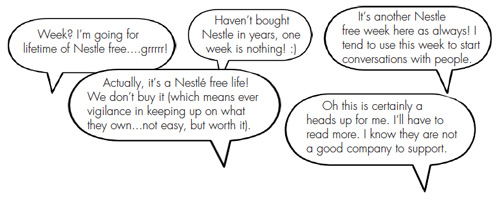 Facebook Nestle
Facebook Nestle
Nestlé, Good Grief! - The Musical
The annual demonstration at Nestlé (UK) HQ in Croydon had a musical theme. The video clip below includes a partial rendition of one of Alison Blenkisop’s songs from the book Fit to Bust!
Also includes the Nestlé, Good Grief! jingle. Nestlé’s slogan is “Good Food, Good Life”. Boycotters look at how executives run the company and say “Nestlé, Good Grief!”.
Feel free to record your own mime to the jingle - or your own jingle - and we’ll add it to the site.
Dates for 2012
19 May 2012 (Saturday): Annual demonstration at Nestlé (UK) HQ, Croydon or Crawley (Nestlé is in the process of relocating)
29 October - 4 November 2012: International Nestlé-Free Week
If you forgot the event this year, sign up to Baby Milk Action’s email alert list - click here.
Protests in North America and Switzerland
Join the Newark Protest
Nestlé’s partnering with the Mayor of Newark, New Jersey, USA, to the tune of US$100,000 has sparked protests and petitions from campaigners. Under the partnership with the city, Nestlé nutritionists will be given access to all 15 of the Family Success Centers to provide training on “breastfeeding and nutrition”.
Maria Parlapiano and Renee Hefti - Graham, organizers of the protest say,
“There is no doubt about Nestlé’s real agenda...The ink wasn’t dry on Nestlé’s press release of the presentation to the Mayor before formula ads and coupons started popping up”
Do sign up to the petition and encourage others to help stop this.
http://www.change.org/petitions/stop-newarknestle-now
Dishounourable degree in Alberta
The University of Alberta received messages of protest from around the world as it planed to award Mr. Peter Brabeck-Latmathé, the Chair and former Chief Executive Officer of Nestlé, an honorary degree for contributing to “the preservation, distribution and management of one of humanity’s most vital resources: water.” The University President went ahead with the award, suggesting protests came solely from the Council of Canadians. However, 70 organisations from 20 countries signed its letter of protest and demonstrations took place inside and outside the university when the degree was presented on 1 March 2012.
Protests continue over the President’s invitation to Mr. Brabeck to sit on an external advisory board for a new university-based Water Initiative.
For Baby Milk Action's press release, see:
http://info.babymilkaction.org/pressrelease/pressrelease10feb12
● A new documentary film called Bottled Life, produced in Switzerland, looks at the scandal of Nestlé Pure Life brand of bottled water.
Nestlé taken to Swiss court over spying ring
Brazilian campaigner, Franklin Fredrick, was a witness at a court action in Switzerland in February over Nestlé’s infiltration of the campaign group, ATTAC Switzerland, with three spies.
To World Radio Switzerland he told of his worries when he found out how much information had been gathered on him during his successful campaign to stop Nestlé’s damaging Pure Life water bottling operation in the spa town of São Lourenço.
Campaigners were also concerned about the safety of trade union members in Colombia whose details were available to the spies. Paramilitaries have killed trade unionists organising at Nestlé factories. Hear an interview with trade unionists in Baby Milk Action's archive - click here.
New resources for promoting the Nestlé boycott
A smart phone version of the boycott products list is now available on our site.
http://www.babymilkaction.org/isite/
We also thank Nick Rundall for coming up with a “Nestlé - Good Grief!” jingle. This is available to download as a text alert/ringtone, and is also included with our new widget, which you can add to sites or blogs about the Nestlé boycott using the code you will find in our Nestlé-Free Zone at:
http://info.babymilkaction.org/nestlefree


Also thanks to Robyn Bowman and Kitty Simmons for new boycott images (right and left, respectively).
Add your own images to our site at:
http://info.babymilkaction.org/boycottgallery
Nestlé Policy versus the International Code
If it is not possible to view the image below clearly, download the pdf.

Nestlé’s policy is much weaker than the International Code, but even its own response shows it breaks it, for example, advertising follow-on milks in ‘higher-risk countries’.
Nestlé executives refuse to stop violations...
Nestlé has issued an analysis of its violations highlighted in the Breaking the Rules, Stretching the Rules 2010 (BTR) report. It dismisses all but four of the violations. A selection of Nestlé's arguments are examined here.
● Executives continue to defend promoting their formula with health claims, such as that it ‘protects’. Logos with such claims have been added to labels in 120 countries it has said. Nestlé does not respond to the fact that Article 9 prohibits idealising text and logos.
● Nestlé claims that promotional materials were intended for health workers only and are “scientific and factual”, whereas the evidence shows they have unsubstantiated claims and sometimes have been found distributed to pregnant women and parents.
● Nestlé claims that many products are not covered by the scope of the code, limiting its application to formulas up to 12 months only although breastfeeding is recommended into the second year of life and beyond. Products are often similarly branded so promotion of milks for older babies serves to promote the whole range.
● BTR exposes that Nestlé rents shelf space in Vietnam and issues instructions on how its infant formula should be displayed. A prominent display of 124 tins of formula at eye level gains the shopkeeper the greatest reward. Nestlé says it is simply paying for the shelf to be set up in “a logical and clean manner.” Violation report dismissed.
...unless you support our campaigns
Nestlé said it would act on just four violations, most of which had already been targeted, including its leaflet claiming its formula is “The new ‘Gold Standard’ in infant nutrition”. Thousands of boycott supporters targeted this violation in our ‘email Nestlé’ campaign from June 2010.
Nestlé says: “This concern has already been raised with Nestlé by Baby Milk Action and a response was provided.” Nestlé claims “Gold Standard” was “meant to refer to the gold colour of the labels of the product” and that the leaflet was “discontinued in November 2010”.
So please keep sending messages - they work!
STOP PRESS - Nestlé formally charged in India
Nestlé has been committed to trial in India by a magistrate for labelling formula in violation of the Infant Milk Substitutes Act, including not translating warnings into Hindi. Nestlé’s lawyers have managed to delay the trial for seventeen years, but Nestlé now faces a fine or even imprisonment of the Managing Director if convicted. Although Nestlé changed those labels, its latest labels also break the law (page 7).
Breaking the Rules
New Nestlé director admits violations that company denies
There was controversy as Ann Veneman UNICEF’s former Executive Director was voted onto the Nestlé Board of Directors at its shareholder meeting in Lausanne, Switzerland, on 14 April 2011.

Nestlé AGM 2011: Ann Veneman uses a pre-recorded video presentation.
In a Reuters report the previous day a UNICEF spokeswoman said:
“Ms. Veneman left UNICEF nearly a year ago and is now a private individual. UNICEF would not presume to comment on any personal choices. I can confirm that UNICEF does not take funding from Nestle. I can also confirm that Nestle violates the code.”
Baby Milk Action’s Patti Rundall was prevented by Nestlé’s Janet Voûte from speaking to Ms Veneman until after the AGM. Then, as Ms Veneman looked through the Breaking the Rules Report, Ms Voûte hovered around, dismissing allegations of wrong-doing, and incorrectly citing Nestlé’s FTSE4Good listing as evidence of code compliance (see page 4).

Patti Rundall asks Ann Veneman not to join the Nestlé Board
Following the meeting, to the Associated Press, Ms Veneman “acknowledged Nestlé isn’t fully complying with a voluntary breast milk code adopted by World Health Organization” and pledged to “work from within to change the world’s biggest food and beverage company.”
See: http://info.babymilkaction.org/pressrelease/pressrelease13apr11
Danone the new giant threat to infant health
Danone is rivalling Nestlé as a source of violations since taking over the NUMICO companies (Nutricia, Milupa and Cow & Gate).
According to Euromonitor Danone controls about 15% of the global baby food market. However other reports indicate that it plans to dramatically expand its presence. In Ireland it will treble its capacity to 100,000 tonnes annually with 98% of its output exported and commercialized in more than 60 countries worldwide (Irish Times 15 July 2011). This is truly scary. Danone is very aggressive in Asia, and gained a strong foothold in India with its purchase of Wockhardt baby foods. It is also infiltrating many UN and health worker bodies where it is pushing health claims and other marketing strategies behind the scenes at (see page 16).
Danone and Mead Johnson are competing with Nestlé to buy SMA/Wyeth, Pfizer’s $10 billion infant nutrition business, which has over a quarter of its sales in China. The $6 billion chinese market is expected to double by 2016. See: Nestle and Danone-Mead to battle for Pfizer unit (Reuters 2 March 2012).
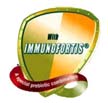


However, Danone has promised to stop 50% of the violations listed in the Breaking the Rules report and, after the Immunofortis claim was deemed illegal in Europe, to stop that particular claim worldwide by the end of 2012. IBFAN has written to Danone asking it to end all claims on formulas and baby foods, for further information about the violations it claims it will stop and those it wont.
As we take stock of this emerging situation a four-point plan similar to that put to Nestlé for ending the boycott has been put to Danone.
The Business of malnutrition - profiting from the poor
Along with a dozen developing countries and our IBFAN partners we achieved partial success at the November meeting of Codex (the WHO/FAO body that sets international food standards), by stopping the use of promotional claims on labels and advertising of fortified foods for babies.
Among those calling for the claims in order to ‘prevent mallnutrition’ were the baby food industry and the Global Alliance for Improved Nutrition (GAIN), a public private partnership that works with over 600 companies, including Danone, PepsiCo, Mars and Kraft. Thankfully, Brazil, Nigeria, Chile, Zimbabwe, Botswana, Gambia, Togo, Cameroon, Nicaragua, Costa Rica, South Africa and Bolivia, backed by WHO, spoke up in favour of the WHA Resolutions that call for an end to such marketing.
The multi-billion profits to be made from exports to the developing world are tempting, especially if they can masquerade as being ‘humanitarian.’ But there are huge risks when the focus is on babies. Baby food promotion can undermine breastfeeding, increase family poverty and create dependence on expensive and often unnecessary products. Malang Fofana, the head of the Gambian delegation, expressed the fears of many:
“Because of the move to ‘product-based’ solutions, funding is already drying up for most infant and young child feeding support programs and for community-based approaches that teach and promote skills to make nutritious family foods from local indigenous ingredients. I fear that once this runaway train leaves the station there will be no stopping it.”
Codex is always a tricky forum. This time 40% of the 268 delegates were from the food industry, with 59 as BINGOS and 49 on government delegations – some even heading delegations. The Mexican delegation was 100% industry and made many industry-friendly interventions, 12 of 15 on the German delegation were industry.
For a fuller press release follow this link: http://info.babymilkaction.org/pressrelease/pressrelease24nov110
GAIN abandons Monitoring Protocol
A GAIN-sponsored initiative, Access to Nutrition Index, proposed to monitor breast milk substitutes marketing by focusing on compliance with companies’ own policies and statements. Following our complaints GAIN accepted that the scheme risked being a whitewashing excercise so the idea was abandoned.
SUN worry
When fortified processed foods are promoted as the first solution to malnutrition, governments can come under pressure to enter partnerships with businesses whose interests conflict with public health objectives. Scaling up Nutrition (SUN) describes itself as a ‘movement’ and has been promoting partnerships for the last two years in order to raise the profile of nutrition. However SUN has not yet established principles of engagement with the private sector.
Special Rapporteur on the Right to Food
In his report, Olivier De Schutter, the Special Rapporteur, calls on countries that are committed to ‘scaling up nutrition’ to
“begin by regulating the marketing of commercial infant formula and other breast-milk substitutes, in accordance with WHA resolution 63.23, and by implementing the full set of WHO recommendations on the marketing of breast-milk substitutes and of foods and non- alcoholic beverages to children, in accordance with WHA resolution 63.14.”
GAIN is requested to “include a clear exit strategy to empower communities to feed themselves” ...“when ecosystems are able to support sustainable diets, nutrition programmes, policies and interventions supporting the use of supplements, RUTF [ready- to-use therapeutic foods], fortificants and infant formulas are inappropriate and can lead to malnutrition, and ... the marketing of these food substitutes and related products can contribute to major public health problems.”
Governments should govern - Corporations should follow the rules
Baby Milk Action's Patti Rundall and Mike Brady have had a paper with the above title published in SCN News. SCN is the UN System Standing Committee on Nutrition. The theme of the issue is Nutrition and Business: How to Engage.
To download high-definition pdf version - click here (7Mb)
To download low-definition pdf version - click here (4 Mb)
News Roundup
American Academy of Pediatrics backs 6 months breastfeeding
The new American Academy of Pediatrics Policy stresses that breastfeeding is a norm and a public health issue, not a ‘lifestyle’ choice.
“The AAP recommends exclusive breastfeeding for about 6 months, with continuation of breastfeeding for 1 year or longer as mutually desired by mother and infant, a recommendation concurred to by the WHO and the Institute of Medicine.”
http://pediatrics.aappublications.org/content/early/2012/02/22/peds.2011-3552
Abbott pays bloggers to review Similac iPhone app
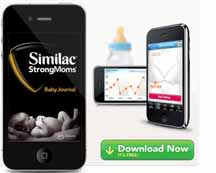 Partnerships with phone companies are often cited as useful ways to disseminate health messages. But unless conflicts of interest are checked there can be risks. Abbott Ross paid mothers in the US to give positive reviews of its new iPhone Similac app: “designed to help new parents track baby’s eating, sleeping ....tracking breastfeeding or bottle-feeding…including noting details such as which breast baby fed from last so you don’t forget.”
Partnerships with phone companies are often cited as useful ways to disseminate health messages. But unless conflicts of interest are checked there can be risks. Abbott Ross paid mothers in the US to give positive reviews of its new iPhone Similac app: “designed to help new parents track baby’s eating, sleeping ....tracking breastfeeding or bottle-feeding…including noting details such as which breast baby fed from last so you don’t forget.”
Thanks to Miriam Labbock, of the Carolina Global Breastfeeding Institute for spotting this double scam.
http://www.breastfeeding4health.com
Taking over counselling & education
Baby food companies are increasingly ignoring Article 5.5 of the International Code which forbids them from making contact with pregnant women or mothers of young children. When Nestlé submitted a commitment to the UN’s Every Woman Every Child Initiative, to expand “nutrition education to teenage girls in all its milk villages in India before they reach the age of marriage, so that they will have the nutritional knowledge to best feed their children when they reach childbearing age,” no one noticed that this was inappropriate.
The majority of education committments on the EU Commission’s Platform for Action on Diet and Physical Activty are funded by the food industry.

This Mars-funded Consumer Information for the Turkish Community in Germany. implies that a Bounty chocolate bar has the same nutritional value as an apple.
http://info.babymilkaction.org/education
Babies need Mom-Made NOT Man-Made
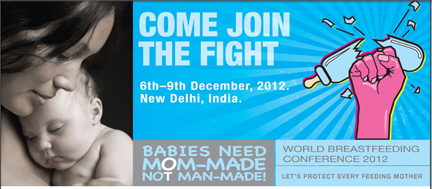
The IBFAN/WABA World Breastfeeding Conference will take place in Delhi in December 2012. For details and to register, see:
http://www.worldbreastfeedingconference.org/home
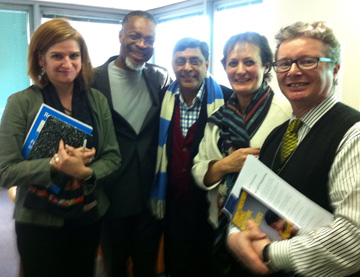
Dr Arun Gupta (IBFAN Asia) and Patti Rundall in New York to discuss UNICEF support for the global conference. For UNICEF, from the left: Christiane Rudert, Nutrition Specialist, Dr Nicholas Alipui, Head of Programmes and far right, David Clark, Legal Officer.






